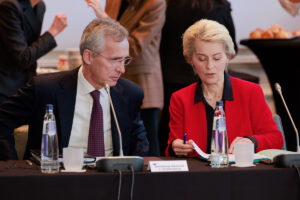 (Siegfried Mureșan is Vice Chair of the Committee on Budgets and Substitute Member in the Committee on Economic and Monetary Affairs)
(Siegfried Mureșan is Vice Chair of the Committee on Budgets and Substitute Member in the Committee on Economic and Monetary Affairs)
*
The European Union (EU) budget is an investment budget and the predictability of revenue is essential. That is why a legitimate question we should ask today is how the EU budget will look after 2020 and whether Brexit will be an opportunity or a threat to the future multiannual budget.
Regardless of the relationship that the European Union will have in the future with the UK, we need to be prepared and use now this moment to reassess the way to fund the future multiannual European budget because it is essential not to have a lower value budget after Brexit.
That is the only way we can continue to support the policies and projects that ensure the development of the economies of the 27 European states.
We are now halfway to the end of the Multi-Annual Financial Framework 2014-2020 that sets the limits for the general annual budgets of the European Union, and the UK still must keep its commitments under this framework regarding its contribution to the EU budget.
During all this period left, as long as the UK is still a member state, the impact of its exit from the EU on the budget is zero.
But the question we all should ask today is what we shall do in the long run after Brexit, since the UK, which is a net contributor today, brought more money to the EU budget than it received.
Scenarios to offset Britain’s contribution to the EU budget
The future European post-2020 budget must be able to meet the challenges we face and the expectations of the European citizens and its value should not be reduced once the UK exits the EU, although it will be deprived of this country’s financial contribution. At present, there are three scenarios whereby we can offset Brexit’s contribution to the UK today.
In the first scenario, all 27 member states, especially net contributing countries such as Sweden, Germany, Austria, the Netherlands, will increase their contribution to the EU budget to offset the share of today’s UK contribution. I do not believe, however, that this scenario is realistic because these countries are already making more money to the EU budget than they receive and will not be willing to pay even more.
In the second scenario, the budget will decrease and we shall have fewer resources, so the EU will see itself in the situation to do less than what it has committed today to do. This is unacceptable, especially for the net beneficiary countries, as Romania, which will see their funds that the EU has pledged to allocate to reduce the development gap with the Western countries shrunk. Besides, we must have all the resources available to get a stronger Europe. We cannot do more for people with fewer resources.
The third scenario is a combination of the first two: budget to be reduced to a certain extent, and the remaining gap to be covered by all states, mainly the rich ones. Nor is this scenario easy to implement because it involves difficult political negotiations and, most often, given the current divergences between member states, they will not succeed in strengthening the Union but weaken it further.
These scenarios now under discussion are either not realistic or will give rise to far too tough political negotiations that will lead to divisions mainly between Eastern and Western countries. It is therefore clear that we need to think about another way of financing the European budget.
How the EU budget is now funded
Now, 76% of the resources of the European Union’s budget comes from member states’ contributions that imply a fixed percentage rate applied to each member state’s Gross National Income (GNI).
Other main resources come from customs duties, sugar levies, and Value Added Tax (VAT) resources, and a small share comes from contributions to certain programs of non-EU countries, fines applied to companies that are not compliant with the European rules and the tax on the EU staff’s income.
Of all these, the only ones that work properly are the revenues from customs duties and sugar levies. The contributions of the member states, which also have the largest share in the European budget, are uneven, unpredictable, being linked to the economic prosperity of each state and always subject to political negotiations. Also, the VAT-based resource has a complicated calculation method and depends on the payments of the member states.
To stop being dependent on the contributions of member states that, as we can see, could affect the budget quite heavily and to have predictability and transparency in terms of revenue, the sustainable solution is for the European Union to have its own genuine sources of funding in the future.
That should not mean though increasing the tax burden on the European citizens, so we need to think about how we can do that.
Reforming EU budget and financing it from own genuine sources
First, the current sources of funding need to be reformed and a way should be found so that some of the national fees we already pay to go directly to the EU budget.
A concrete example would be the simplification of the current method of calculating the VAT-based resource by applying in all member states a fixed rate on the net value of supplies of goods and services for the intra-Community acquisitions of goods and on the imports of goods to which a standard VAT rate is applied in each member state. This way, virtually a percentage of the VAT paid by end-users could go directly to the EU budget.
It may also be considered that a percentage of the tobacco excise duty or other charges on vices, such as betting and gambling charges, to be redirected to the European budget. Last, but not least, this procedure of redirecting the revenue could also be applied to some future taxes at the European level, such as the Financial Transaction Tax (FTT) or the Common Consolidated Corporate Tax Base (CCCTB).
We have just given some examples of revenue sources for the future budget of the European Union, which would provide a stable, predictable revenue base and which, first, would no longer depend on the political negotiations between member states. But it should be said that this redirection would somewhat reduce the state budget revenues and there could an opposition to be faced from some member states to this funding method because they will no longer be able to decide politically on their own contributions.
At the same time, if some countries would be tempted to raise those taxes or introduce new ones to offset the redirection of a part to the EU budget, reducing the GNI-based contribution should discourage that and balance the revenue and expenditure balance.
Romania’s role in managing negotiations on multi-annual budget
The European Commission will present in May 2018 the plans for the future post-2020 European budget. In an optimistic scenario, we shall have 5-6 months, between October – November 2018 and March 2019, to make important decisions about the future EU’s multiannual budget, before the European Parliament ends its mandate.
That is when Romania will hold the presidency of the Council of the European Union in the first half of 2019. The stake for our country is double during this period.
First, it is desirable for the future of the European budget to be clarified before the elections for the European Parliament in 2019 and we, as the country holding the Presidency of the Council of the EU, shall have then a key role in facilitating an agreement that would have a unanimous support in the Council of the European Union.
Otherwise, if negotiations fail, they will only be resumed after the new European Parliament, which will be voted in May 2019, and the new European Commission will be in office, namely at the end of 2019. This way, the budget would be adopted in the second half of 2020 which would mean that on 1st of January 2021, when the new multiannual budget starts, there will be nothing prepared to start the absorption of the European funds and the effects will be felt by beneficiaries from all member states.
Equally important for Romania in the negotiations on the future European budget is the cohesion and rural development policy. We need to make sure that the European funds allocated to our country are not reduced after 2020.
The cohesion funds are needed for Romania’s development, but the cohesion policy is in the interest of all member states. For example, if highways are built in Romania with European funds, Romania benefits from that, but also German, Austrian, French investors who are investing in our country.
That is why we should be persuasive during the negotiations that we can bring added value by using these funds and they should be under no circumstances reduced. This means having good projects and a level of absorption of the EU funds close to 100% in the current multiannual financial framework 2014-2020.
The EU future, linked to the way the European budget is built
The future of the European Union depends on how the future European budget will reflect the common priorities of the member states.
The main priorities that the 27 member states will have in the forthcoming negotiations are related to the increase in the competitiveness of the economies, common defence, research, innovation and agriculture. These are the areas that provide us with a sustainable development that generates jobs for the European citizens, all in a safe environment.
The future European budget must reflect these priorities, provide the resources to finance them and that if we want to have an European Union able to meet the European citizens’ expectations.
*
Siegfried Muresan is Vice Chair of the Committee on Budgets and Substitute Member in the Committee on Economic and Monetary Affairs









